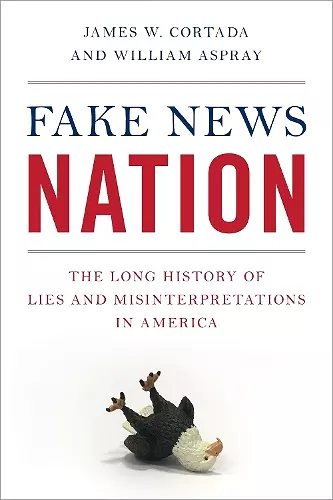Fake News Nation
The Long History of Lies and Misinterpretations in America
James W Cortada author William Aspray author
Format:Hardback
Publisher:Rowman & Littlefield
Published:1st Oct '19
Should be back in stock very soon

How rumors, lies, and misrepresentations shaped American history After the election of Donald Trump as president, people in the United States and across large swaths of Europe, Latin America, and Asia engaged in the most intensive discussion in modern times about falsehoods pronounced by public officials. Fake facts in their various forms have long been present in American life, particularly in its politics, public discourse, and business activities – going back to the time when the country was formed. This book begins explores the long tradition of fake facts, in their various guises, in American history. It is one of the first historical studies to place the long history of lies and misrepresentation squarely in the middle of American political, business, and science policy rhetoric. In Fake News Nation, James Cortada and William Aspray present a series of case studies that describe how lies and fake facts were used over the past two centuries in important instances in American history. Cortada and Aspray give readers a perspective on fake facts as they appear today and as they are likely to appear in the future.
This volume makes a useful contribution to the literature on disinformatics. Deceit has always been a constant companion to the tyrant, propagandist and missioner. What is new to our post-truth era is the digital weaponization of deceit, particularly under the rubric of social media. -- Hal Berghel, PhD, author of the Out of Band column in IEEE Computer
While smart phones and social networking have brought "fake news" to the forefront of today's politics and discourse, Cortada and Aspray brilliantly examine the much longer political, cultural, and technological history of misinformation and false facts through elegant cases on elections, climate science, advertising, and in other realms. -- Jeffrey R. Yost, author of Making IT Work: A History of Computer Services Industry (MIT Press, 2017).
This book provides a context for qualifying our current national angst about fake news. It does not promise speculative solutions but situates the reader in a long history of information use and misuse and urges us to think critically and reflectively about a fundamentally human-information phenomenon rather than a contemporarily unique condition. -- Gary Marchionini, Cary C. Boshamer Professor, University of North Carolina at Chapel Hill
Using the 2016 United States presidential election as a touchstone, this book looks at how information has long been weaponized in American public life. Grounded in more than two centuries of historical examples, and replete with details, Cortada and Aspray tell a tale of fake facts and fake news and all types of information prevarications in-between. Unafraid to call a lie a lie, the authors take us on a journey through history to show how information has been yielded in the political, business, and policy realm in the pursuit of specific, often nefarious, goals. In the process the book reveals patterns, insights, and understandings to help the reader navigate a past, present, and future in which people behave badly and lies and misrepresentations are unfortunately the norm. -- Ciaran Trace, Associate Professor at the School of Information at the University of Texas at Austin, Editor of Information & Culture: A Journal of History
Cortada and Aspray’s brilliantly selected and crafted case studies are must reads, which bring historical insight to issues of fake news, disinformation and conspiracy theories of our digital age. -- William H. Dutton, University of Southern California and Oxford University
For those of us who might believe that we are living in a unique period of history where the emergence of fake news and alternative truths is confounding political and public life, this outstanding volume sheds light on the common use of misinformation across the history of the United States. The authors tell us the story of how lies, fake facts, misinformation, myth-making, and conspiracies have affected American public discourse, political life, business and science policy. They take the reader on a fascinating journey through eight carefully chosen case studies of events from our countries political, business, and science policy history. These events include the election and assassination of presidents, U.S. participation in wars, the long-lasting popularity of patent medicines, the use of misleading science in defense of the tobacco industry, and the politics of climate change. With these case studies we learn how information has been used and misused. The authors reveal how we experience truth, certainty and knowledge and where this is undermined by untruth, uncertainty and ignorance. Through these historical accounts the reader will learn that facts and lies are socially constructed; that information has been weaponized by individuals and organizations to achieve their goals; that facts have been linguistically reconstructed through exaggerations, misrepresentations, conspiracies, and myth-making to create and disseminate fake facts; that support for participation in the Spanish-American War was generated by fake facts published in the media; that the public relations industry has convinced us of alternative versions of truth; that rumors evolve to become facts; and how the current debate over the scientific evidence of climate change has developed, and where this might lead us in the common interest of preserving our planet. I highly recommend this superbly written and researched book. It makes a very important contribution to our understanding of the nature of information, and the role it plays in our daily lives, and a strong argument for the conscientious development of high-level information, technology, and data literacy skills for all people as a necessary foundation for engaged civic life. -- Harry Bruce, dean emeritus and professor, The Information School, University of Washington
ISBN: 9781538131107
Dimensions: 235mm x 159mm x 23mm
Weight: 553g
320 pages